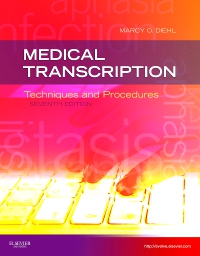
Medical Transcription - Elsevier eBook on VitalSource, 7th Edition
Elsevier eBook on VitalSource

The trusted authority in medical transcription for more than 30 years, Medical Transcription: Techniques and Procedures, 7th Edition helps your students master the fundamentals of medical transcription and meet the challenges of the evolving medical transcription field. Respected authority Marcy O. Diehl delivers proven, practical training in the skills and technology essential for students' success, including proofreading, editing, speech recognition technology, and more. This new edition also reflects an increased emphasis on medical editing and other related fields to keep your course current with the changing medical transcription profession and fully prepare your students for their roles in health information management.
-
- Comprehensive coverage and practical exercises demonstrate fundamental editing/transcription concepts and boost students' proficiency in:
- Punctuation
- Capitalization
- Numbers
- Abbreviations and symbols
- Word endings
- Formation of plural forms
- Exercises and helpful hints enhance students' proofreading and editing skills and help prevent common errors.
- Extensive practice and review exercises on Evolve reinforce students' understanding and give them the experience to confidently move into the transcription workforce.
- New chapter highlights the transcriptionist's emerging role as a medical editor and how it impacts health information management and patient safety.
- Take Note boxes provide quick access to key editing/transcription tips.
- From the Field sections deliver helpful insight from practicing medical transcriptionists.
- Updated information familiarizes students with the latest medical transcription equipment.
- Live transcription exercises help students meet the Association for Healthcare Documentation Integrity (ADHI)'s live transcription requirement and practice applying transcription skills to scenarios commonly encountered in practice.
- Additional exercises test students' ability to edit voice recognition software-generated reports.
-
- New chapter highlights the transcriptionist's emerging role as a medical editor and how it impacts health information management and patient safety.
- Take Note boxes provide quick access to key editing/transcription tips.
- From the Field sections deliver helpful insight from practicing medical transcriptionists.
- Updated information familiarizes you with the latest medical transcription equipment.
- Live transcription exercises help you meet the Association for Healthcare Documentation Integrity (ADHI)'s live transcription requirement and practice applying your transcription skills to scenarios commonly encountered in practice.
- Additional exercises test your ability to edit voice recognition software-generated reports.
-
Section 1: Career Role and Responsibilities
1. The Medical Transcription's Career, Including Ethical and Legal Responsibilities
Section 2: Tools of Transcription
2. Equipment and Technology
Section 3: Transcription Guidelines
3. Punctuation
4. Capitalization
5. Transcribing Numbers, Figures, and Abbreviations
6. Letter Transcription
7. Proofreading, Making Corrections, and Quality Assurance
8. Using Reference Books: Learn How to Get Help From the Experts
9. Word Endings: Plurals, Nouns, and Adjectives
10. Grammar Review
Section 4: Medical Records and Reports
11. Outpatient Medical Chart Notes and Daily Progress Notes
12. Preparation of a History and Physical Examination Report
13. Preparation of Miscellaneous Medical Reports
Section 5: Correspondence and Business Documents
14. Writing Business Documents: Email, Memos, Agendas, Minutes, and Policies
15. Making the Transition from MT to Speech Recognition Editor
16. Establishing Your Career and Applying for Transcribing Positions
Section 6: Appendices
A: Answers to Tests
B: Reference Materials
C: Medical Documents
D. Rules and Helpful Hints for Transcribing


 as described in our
as described in our 